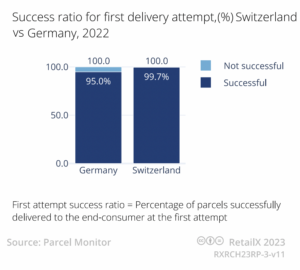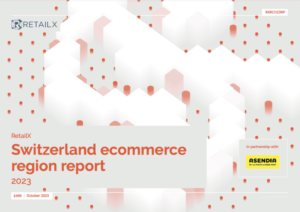The success ratio for first delivery attempts in Switzerland is as high as 99.7% despite its national postal service experiencing challenging conditions in 2023, according to the RetailX Switzerland Ecommerce Country Report 2023.
The research found economic challenges this year has resulted in Swiss Post delivering fewer parcels than before, but has still focused on maximum efficiency.
At the end of January, Swiss Post announced that it had sorted or delivered a total of 194 million parcels in 2022. Despite the colossal figure, this was actually 4% less than in the previous year, 2021, which had seen the company set its all-time record. There was one key difference in 2022: “Since the outbreak of the war in Ukraine… consumer confidence has been subdued as people have been doing less shopping online”.
A report from August confirmed that Swiss Post was experiencing challenging conditions in 2023, with a sharp decrease in profits for the first six months of the year. Alex Glanzmann, head of finance, pointed to the negative impact of interest rates and inflation, “with sharp rises in costs for fuel, energy, transport, materials and salaries”.
Unsurprisingly, the trend for people to send fewer letters has continued, with volumes having declined by 33% over the past ten years. However, Swiss Post has opened three new parcel processing locations so far this year – one of which, previously the Härkingen Letter Center, now processes parcels as well as letters, with the addition of 80 new jobs.

Delivery success
While in neighbouring Germany the success ratio for first delivery attempts amounts to a very creditable 95%, in Switzerland it is as high as 99.7%. As we can see from the graph, the issue ratio in Switzerland is also extremely high, with 99.2% of deliveries experiencing no issues.
We do not have current figures for issue ratios in Germany, but the numbers for delivery transit times show that in Germany the carrier holds a parcel for just 1.2 business days before making the first attempt to deliver. In Switzerland, by contrast, the carrier retains the parcel for a longer average time of 1.5 business days before making the initial (and almost always successful) delivery attempt.
When surveyed as to which options they considered good incentives to buy an item online, the most popular choice for Swiss consumers was ‘Direct delivery to my home’, which was cited by 51% of respondents. The round-the-clock availability of online shopping found favour with 41%, and the same percentage agreed it was a more convenient way of shopping. Cheaper prices were a factor for 38%, while 37% were attracted by greater product range, and the same figure cited ‘avoiding crowds’ as a good reason to shop online. ‘More possibilities to compare’ (32%), ‘Undisturbed shopping process’ (30%) and ‘More product information’ (29%) were also relevant factors.
Swiss consumers have few qualms when it comes to returns, with a massive 45% of fashion purchases being sent back in 2022. By comparison with the other ten European countries in this sample, only Germany and Austria are comparable, with 44% and 36% respectively, while at the other end of the scale Italy has a return rate of just 17%. As we reported last year, online shoppers in Switzerland were less likely overall to return an item than their counterparts in the UK, but when it came to clothing and shoes they were more likely to return items.
These high volumes of returns are occurring even though consumers in Switzerland have no automatic legal right to exchange or return purchased goods. However, online shoppers are taking advantage of free returns where available, as well as services such as Swiss Post’s highly efficient Mailbox Plus national and international returns management system.
This feature was authored by Patrick Reid, it originally appears in the RetailX Switzerland Ecommerce Country Report 2023. Download it in full for a clear overview of the general market context, all the way through to intricacies in consumer behaviour. In particular, the report focuses on Switzerland’s distinct flavour of digital maturity, and how this has evolved due to increased online activity during the pandemic, as well as what this means for merchants.








